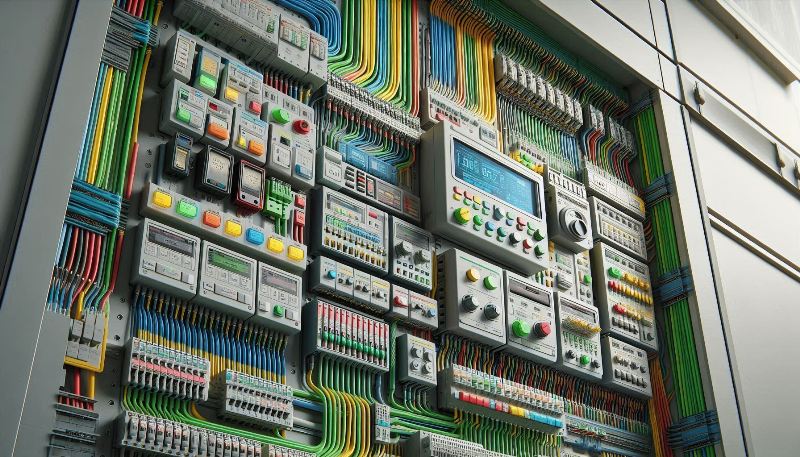The Importance of an Efficient Electrical Control Panel: Enhancing Safety and Performance
In today’s industrial and commercial environments, the role of an efficient electrical control panel is critical. Whether you are managing a manufacturing facility, commercial building, or even residential setup, having a well-designed and efficient control panel can drastically improve operational safety, system performance, and energy management.
What is an Electrical Control Panel?
An electrical control panel is an assembly of electrical components that control and regulate the flow of electricity to different equipment and machines. It acts as a centralized unit where power is distributed, monitored, and controlled, ensuring that machinery operates effectively while maintaining safety standards.
Electrical control panels are essential in sectors like manufacturing, energy, and building automation, where precise control over electrical systems is crucial for productivity and safety.
Why is Efficiency Important in Electrical Control Panels?
An efficient electrical control panel offers several benefits that can save time, reduce costs, and improve operational outcomes. Below are key reasons why efficiency is critical:
- Energy Savings: An efficiently designed control panel can optimize the energy distribution across machinery, ensuring that no energy is wasted. This is particularly important for industries with heavy electrical loads, as improved efficiency leads to reduced energy consumption and lower operational costs.
- Improved Safety: Safety is a top concern in electrical systems. Efficient electrical control panels reduce the risk of electrical failures, short circuits, and fires. Proper design and regulation ensure that power is distributed safely, and that emergency shutdown systems are reliable and responsive.
- System Performance: An optimized control panel enhances the performance of the machinery it governs. By ensuring that electricity is distributed at the right voltage and current levels, the lifespan of machines can be extended, and downtime due to electrical issues can be minimized.
- Scalability and Flexibility: A well-designed panel allows for future scalability, meaning it can adapt to changing operational needs. As systems grow and expand, an efficient panel can be modified or upgraded without the need for a complete overhaul.
Components of an Efficient Electrical Control Panel
- Circuit Breakers: These protect the system from electrical overloads and faults, ensuring that the machinery or devices connected to the panel are not damaged by excessive current.
- Relays: Relays control the flow of electricity by opening or closing circuits. They act as switches to regulate the electrical power directed to machines or devices.
- Programmable Logic Controllers (PLCs): PLCs are used for automating various processes. They ensure smooth control of different operations, such as starting and stopping machines, based on pre-programmed instructions.
- Human-Machine Interface (HMI): An HMI allows operators to interact with the system, providing real-time data and feedback on the operation of machines connected to the panel. Efficient panels feature intuitive and easy-to-use HMIs that improve decision-making and operational oversight.
How Do Electrical Control Panels Work?
Electrical control panels regulate the flow of electricity from power sources (like the grid) to the machines that require power. They distribute power in accordance with the demand of each connected device, monitor voltage and current levels, and include safety mechanisms that shut off power in case of faults or overloads.
The design of an efficient control panel includes strategic placement of all components to minimize energy loss and improve performance. Wiring, cable management, and layout all play a significant role in ensuring smooth and reliable operation.
Trends in Electrical Control Panel Efficiency
- Automation and Smart Panels: With advances in automation technology, electrical control panels are becoming more efficient through integration with smart systems. Automation allows for real-time monitoring, energy management, and predictive maintenance, improving overall efficiency.
- Energy-Efficient Components: Manufacturers are increasingly producing components like energy-efficient transformers and relays to further reduce energy waste and improve the functionality of control panels.
- Compact Designs: Modern control panels are now designed to be more compact without sacrificing performance. This minimizes installation space requirements and can lead to lower production costs.
How to Ensure Your Electrical Control Panel is Efficient
- Regular Maintenance: One of the best ways to ensure the long-term efficiency of an electrical control panel is through routine maintenance. Regular checks can identify any issues early, preventing costly breakdowns.
- Proper Component Selection: Choosing the right components for your panel, such as high-quality circuit breakers and energy-efficient PLCs, is essential for maximizing efficiency.
- Customization: A panel that is customized for the specific needs of your system or facility will be more efficient. Customization ensures that the panel is designed to handle the exact electrical load and operational demands of your machinery.
Conclusion
Investing in an efficient electrical control panel is vital for businesses and industries aiming to improve operational efficiency, reduce costs, and enhance safety. By focusing on energy savings, system performance, and the latest technological trends, businesses can benefit from reliable and scalable control systems that meet their evolving needs. Regular maintenance and careful selection of components will ensure that your control panel operates at its peak performance, delivering long-term value.







